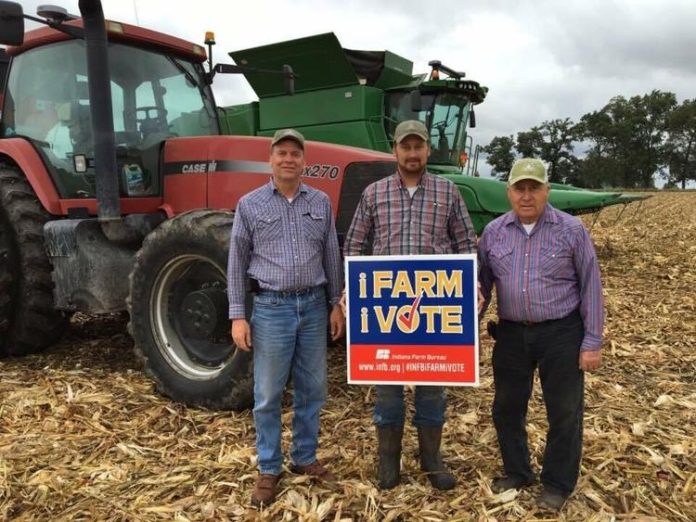INDIANAPOLIS—Far away from tractors and the smell of freshly harvested fields, the Indiana Statehouse is a farm of its own as representatives rake through bills and rise early each morning to get their work done.
Rep. Kendell Culp, R-Rensselaer, knows this all too well, although the full-time farmer is only beginning to plant his roots as an Indiana representative, approaching the end of his first session.
Culp has worked as a farmer in Jasper County since 1978, along with his role as a husband and father. He works on his farm with his father, Kenneth, and adult son, Brandon. Together, they farm corn, soybeans, wheat and beef cattle and operate swine finishing.
In fact, Culp thinks his agricultural background shapes how he approaches politics because of how important farming is to the Hoosier State.
According to the Indiana State Department of Agriculture, Indiana is No. 5 for corn production, and its field of agriculture brings an economic contribution of $31.2 billion. Additionally, more than 80% of Indiana’s land is farmland.
“Rural communities, you know, survive and thrive on the success of the financial success of the people that live there—and a lot of times, that’s agriculture. So, you know, if agriculture has a good year, usually those small, local businesses will have a good year and then help strengthen the community,†Culp said. “That’s why that’s such an important thing to me.â€
In this session, Culp’s main agricultural goals were to help with farmland conservation, which he said helps combat food insecurity. He also authored House Bill 1132, which aimed to establish a land use task force, also helping food insecurity.
Prior to joining the House of Representatives, Culp held many politically focused roles, from working on the Rensselaer school board for eight years to serving as a commissioner for Jasper County.
Culp now serves as a board member of the American Soybean Association and vice president of the Indiana Farm Bureau.
Culp said he learned a lot while working in these smaller, more local roles. Though some may struggle to see the connection between limestone walls and cornfields, for Culp, his time in Jasper County has made the transition to the Statehouse much easier.
“One thing is just how to work with people, how to respond to people, and that’s important, I think, in whatever position you’re holding in public services, to make sure you’re responsive to your constituents,†Culp said. “That’s been a good preparation and, of course, the budgeting part of it.â€
But how did he go from local farmer to state lawmaker? Culp’s wife, Tammy, called it the natural next step.
“Being a state representative, he’s spent a lot of his life representing people anyway,†Tammy said. “This is just the next level.â€
He even had two bills heard in committee that were eventually added to a larger bill, a feat that not every lawmaker achieves.
“As a freshman, sometimes you don’t even get a chance to have a bill be heard, and I had two,†Culp said.
Even with his past experience harvesting crops and raising cattle, leading public hearings and facilitating school board meetings, he still had to adjust to his new responsibilities. Or rather, voting on statewide bills.
“The Statehouse—it’s not new to me, but I’ve never obviously been in this role before. So you look at things from a little different vantage point when you’re pushing … the green or the red button [for voting yes or no on bills]. It makes a difference,†he said.
It’s not like they throw on their ties and go in blind, though. Every time a new member joins the House, they are paired with a “veteran member†to learn the ropes and basic etiquette that come with working a session, which made all the difference for Culp.
“I’ve had several [lawmakers] that have been very supportive and kind of mentor type. I mean, too many to mention specifically, but everybody wants you to succeed,†Culp said. “That’s what’s kind of neat.â€
To aid him during his first year, Culp was assigned a familiar mentor—a friend of his father’s. Rep. Michael Aylesworth, R-Hebron, first got connected with the Culp family over 30 years ago.
Aylesworth and Culp’s father, Kenneth Culp, worked together when Aylesworth was a Republican county chairman in Porter County while Culp’s father worked as a Republican county chairman in Jasper County.
Naturally, when Culp became a representative, Aylesworth was deemed a perfect fit to help him transition into his new role.
“I’ve known the family and Kendell for a good, long time,†he said warmly.
“I was really excited,†Aylesworth said. “He’s in a district right next to mine. And we both come from a farm rural background. So we have a lot in common.â€
Aylesworth says Culp is an asset to the legislature because he brings his agricultural experience to Indianapolis.
“He understands rural America very well, understands the importance of the agricultural community and the concerns that it may have,†Aylesworth said. “So he brings a wealth of background knowledge working in rural communities, small communities and the agricultural sector.â€
For those who haven’t met Culp, Aylesworth says he’s a kind person who cares about his constituents.
“He is a very warm, affable person and very open with conversation. He doesn’t mind visiting with new people, and he’s not shy,†Aylesworth said. “He’s not forward, either. He’s just a very nice person who likes to find out what your concerns are.â€
Away from the Statehouse, Culp lives on a third-generation family-owned farm with his wife.
For Tammy, the transition hasn’t been all that difficult.
“Our life hasn’t changed. I tell him when he leaves to remember where he came from and who he is and what he stands for,†Tammy said.
Culp’s family has helped him out in taking over the farm to continue their three-generation business. It’s safe to say there are people back in Jasper County in Culp’s corner.
“It’s worked well. I’ve got good family support back home that keeps everything going there, so it all works,†Culp said happily. “It’s all worked out really well.â€





